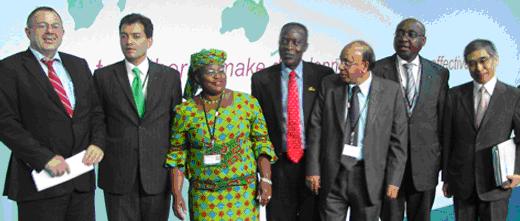In the beginning of September a group of experts, politicians, journalists, former Ambassadors and others with long experience in the “development scene” published the “Bonner Aufruf” or Bonn Call to Action for a new and different development policy. This document has kicked up a major storm in German development circles. The German Development Ministry immediately published a statement decrying both the underlying analysis of the Call to Action and its recommendations. In my view both sides have some valid points and it would be worth opening a dialogue to discuss how to incorporate the legitimate concerns of the authors into the existing development framework. This blog analyses the main points of the Call to Action, their useful and also their problematic sides.
 |
First and foremost, it is interesting that the Call only refers to Africa. Does this mean that traditional development activities have succeeded in Asia and Latin America in the view of the authors? If not, why are they not included? And if so, how can it be that traditional development works in vastly different countries and world regions but not in an entire continent with all its variety? Are there some African countries where it does/has worked? This point needs explanation or clarification. |
The Call is for a different development policy and approach.
It is based on the claim that traditional development cooperation as it is currently run has failed because of two assumptions that were false:
- 1) The “North” can develop Africa (the authors want to place the responsibility firmly on African societies themselves and state that foreign development workers have taken over this responsibility).
- 2) The “North” can achieve the development of Africa through redistribution and “more money = more development”. Furthermore, budget support facilitates corruption and misappropriation of money.
Concerning the first point, it is absolutely true that development aid contributes in many actors in developing countries to reducing the sense of responsibility for their own development and control over how it is to be achieved. It is worth considering how this responsibility can be better supported and fostered (particularly in light of sometimes very high transaction costs). Many efforts have been made over the last 10 years to transfer the responsibility back to the developing country populations themselves – an analysis of the successes and failures could give useful insights to finding a solution.
It is equally true that project conception often leaves the responsibility for achieving results squarely with the international team assigned to an individual project or programme. Here it is important to rethink how projects are planned and run and above all the process of selection of project partners (see my blog from April 8th this year “The Project Partner Dilemma”). A renewed and invigorated dialogue on these issues would therefore be useful.
Concerning the second point, it is valid to observe that significant portions of development money are not being optimally spent. The three High Level Forums on Aid Effectiveness and all related meetings demonstrate the increasing awareness of the international community that much more needs to be done. The Accra Agenda for Action (emerging from the recent High Level Forum) is a lofty document but needs very concrete action to meet its objectives. Also, some hard decisions must be made which given political realities are highly sensitive. Here again, constructive discussions between the actors and stakeholders in the German development scene could potentially give some better solutions.
The Call demands:
|
 |
- Moving the decision-making responsibility for aid to German embassies, giving them appropriate personnel
- Concentrating German aid on the most worthy causes: basic and technical education, microcredits and labour-intensive infrastructure works.
Resetting the responsibility is essential – the only question or argument is how to really do this.
Moving aid in appropriate sectors to civil society is worthwhile – however it is in contradiction to the last point. Particularly education and infrastructure systems must be overseen by central governments. It would be taking the responsibility away from authorities who need to have it, to work with parallel groups on training, education and infrastructure.
And if aid should be moved away from government hands, why concentrate the decision-making back in government hands (the embassies)?
The useful parts of the Bonn Call to Action merit further discussion. But it will need to be phrased in a constructive way so as to contribute to the debate. And the inconsistencies should be addressed. Also: it is much easier to criticize than to make concrete proposals for solutions. The authors of the Bonn Call should also put their necks on the line with specific, well-considered proposals how to achieve their recommendations.






